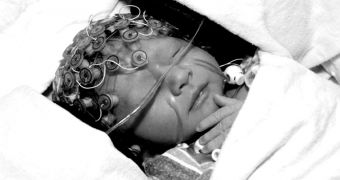Researchers have recently determined that small children are capable of learning very quickly even while sleeping. While this may seem bizarre at first, it actually makes a lot of sense from an evolutionary perspective, given the fact that infants spend the vast majority of their time sleeping. The ability to process and store information while they sleep may represent a way of ensuring their survival. It may also help the young ones make more sense of the world around them in as little time as possible. If they were to learn new things only while awake, then they would generally take numerous years to get to the point they now reach very fast, LiveScience reports.
“It's surprising how quickly they learned – the study took 30 minutes, but I think they actually learned this in half that time. We knew that a baby's job is to be an information gatherer, a data sponge, but I don't think we realized this also happens when they're sound asleep,” says Columbia University in New York developmental neuroscientist and researcher William Fifer. In the experiments, 26 sleeping babies were played a tone, followed by a puff of air to the face, some 200 times over. Towards the end of the study, they had learned to expect the puff, as evidenced by the fact that they were 400 percent more likely than before to tighten their eyelids when they heard the tone being played back.
As the experiment was unfolding, researchers collected data on the children's brain activity via electrodes they had previously attached to their faces and scalps. All of the 26 test participants were between one and two days old, the scientists report. “We don't have very good tools right now to assess brain function in very early infancy, so this could prove very useful in measuring how well the brain is developing. And babies spend so much time asleep, which fortunately could be an ideal time and state to ask questions of their brain. […] if the babies learned something on day one while asleep, do they remember it on day two when they are awake, or has it come and gone?” asks Fifer.
This investigation, which is detailed in a paper published in the May 17 online issue of the esteemed journal Proceedings of the National Academy of Sciences, opens up new avenues of research in neuroscience, experts believe. They say that conditions such as autism and dyslexia are caused by abnormalities in the way the cerebellum functions. This is the same brain area that was found to have increased activity when the children were exposed to the tones and air puffs. A direct consequence of this finding could be the development of new analysis tools that could detect the onset of these conditions very early on.

 14 DAY TRIAL //
14 DAY TRIAL //